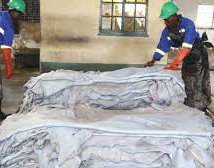In Zimbabwe, leather shoe production has plummeted to 1.5 million pairs per year from a peak of 17 million in the 90s. To revive the leather sector, last year the government launched the Zimbabwe Leather Sector Strategy (2021-2030) to increase investment in the sector and maximize added value. [Feature: Generational inheritance keeps leather making tradition alive in Zimbabwe – NAMPA].
Twenty-year-old Mduduzi Jele is eagerly learning the art and craft of leather making from one of the industry's seasoned experts.
With steadfast determination, Mduduzi Jele, son of a leather technician, hopes to accumulate the prized skill so that he can also pass it down to the next generation.
Mduduzi Jele is one of several young men who have been brought in by Boustead Leather company, a tannery based in Bulawayo, Zimbabwe's second.
His mentor Cecil Rusere believes that it is his social responsibility to pass down the knowledge that he has acquired over the past 32 years in the leather industry.
He said Zimbabwe's position as a competitive leather producer can only be safeguarded if the old impart their wisdom to the young.
"I realized that it is important to teach the youngsters to accumulate knowledge so that our country develops. If I don't share this knowledge, I will get old and die with the knowledge," said Rusere.
Boustead Leather has a production line that encompasses the purchase of hides, tanning, designing, taxidermy and training. All products are handmade in its workshop in Bulawayo.
For Mduduzi Jele, the determination to keep his father's legacy alive drives him.
Mduduzi's father, Themba Jele, who has been in the leather industry for the past 33 years, hopes to keep his legacy alive through his son.
Sibusiso Sibanda, Managing Director of Boustead Leather, is making sure that Bulawayo's rich knowledge and tradition in leathercraft are utilized to the fullest by bringing in young recruits so that they can learn from the old.
Today about 45 seniors are mentoring a group of 18 youngsters at the company.
Sibanda's son, who is still in high school, also comes to learn during the school holidays. By doing so, generational knowledge in the leather making is kept alive in families.
Another young man, Bongani Sibanda (not related to Sibusiso), was brought by his father to learn the art of leather making at the company.
Bongani's father, George Nhondoro Sibanda, said he brought his son into the industry so that the knowledge can be passed on to the next generations.
Bulawayo, previously Zimbabwe's industrial capital, has over the past decades lost its glory due to the impact of Zimbabwe's economic challenges.
As a result, many companies closed, which resulted in experienced workers moving abroad, or leaving the industry.
Through Sibusiso Sibanda's efforts, the talent is being brought back to Bulawayo and utilized to ensure that the city reclaims its dominant position in the leather industry regionally.
Increased production has seen the company spreading its tentacles to foreign markets including China.
"We have some of our hides which will be going to China very soon, we have had very few inquiries, because we were at the Dubai leather expo, so we met quite a number of people that are interested in our leather," said Sibusiso Sibanda.
Through a partnership with the Zimbabwe National Parks and Wildlife Authority, Boustead Leather exports leather products made from game.
Some of the exotic leather projects include crocodile, zebra, wildebeest, and impala, among others.
By the 1990s, the country had one of the most sophisticated leather industries in the region. This was eventually affected by economic sanctions imposed on the country by the West in the early 2000s.

